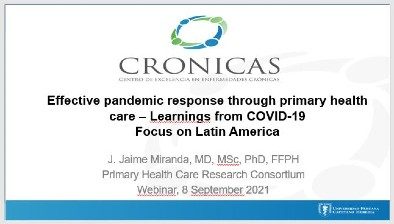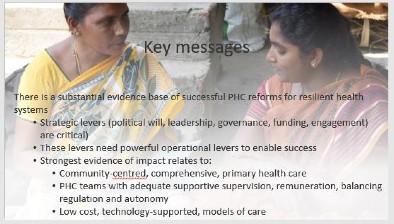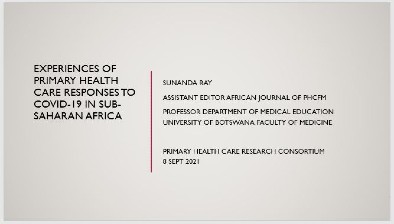
Effective Pandemic Response Through Primary Health Care
COVID-19 has widened the gap of inequity & inequality more than ever. Although primary health care has long been recognized as having a key role in closing these gaps, current evidence has shown that a higher proportion of the budget and human resource allocations have been more hospital oriented and centralized. While community orientation has been the backbone of primary health care response in many countries, engagement of private sectors and primary care providers have been limited even at times of health system crisis.
We must regard the COVID-19 pandemic as a dress rehearsal for the global crises that are ahead of us, from other infection outbreaks but especially from the impact of climate change, so must set systems in place to respond rapidly to these in terms of emergency preparedness but also integrated responses from primary care, public health, and emergency medicine. Countries where health systems have been more developed and have family medicine establishments succeed to have more responsive health services, more integrative services with a multidisciplinary team orientation and coordinated through the district health system. Information Technologies have a substantial role in global development and have proven to have significant roles in improving access to needed services as well as maintain continuity of care for those with chronic illness during this challenging time.
Presenting the broader political and socio-economic landscape of the Latin American region —important to understand where the pandemic sits and what is behind the awful COVID-19 indicators that the region has fared so far— to a network with true experts on the field of primary health care shows clearly, once again, the strengths of primary care to achieve health care for all and decent human life across the globe. This is irrespective of the country's level of income: stronger primary health care translates into better health for all.
Let’s not forget all that we have learned from the pre-COVID era about the importance of strong primary health care as the bedrock to resilient, equitable, high performing health systems. Now more than ever we need to re-affirm the principles of PHC set out in the Astana Declaration and accelerate progress on UHC for all by 2030."
Presentations from the session are here
Effective pandemic response through primary health care – Learnings from COVID-19 Focus on Latin America
Strengthening primary health care in the COVID-19 era: a review of best practices to inform health system responses in low- and middle-income countries
Experiences of primary health care responses to COVID-19 in sub-Saharan Africa






